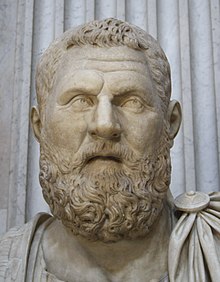
Summary
Gaius or Lucius Fulvius Plautianus (c. 150 – 22 January 205) was a member of the Roman gens Fulvia. As head of the Praetorian Guard, he was very influential in the administration of state affairs, and clashed with Julia Domna, the wife of Septimius Severus.
Gaius Fulvius Plautianus | |
|---|---|
 Plautianus | |
| Born | Leptis Magna, Africa Province |
| Died | 205 Rome |
| Allegiance | Roman Empire |
| Years of service | 197–205 |
| Rank | Praetorian prefect |
| Unit | Praetorian Guard |
| Other work | Consul of the Roman Empire in 203 |
Plautianus was originally from Leptis Magna, southeast of Carthage (modern Libya, North Africa). He was a maternal cousin and long-time friend of the Emperor Septimius Severus. Plautianus' father was another Gaius Fulvius Plautianus, born c. 130, whose sister, Fulvia Pia (c. 125 - after 198), was married to Severus' father Publius Septimius Geta.[1]
Plautianus was praefectus vigilum (commander of the Vigiles in Rome) from 193 to 197.[2]
Plautianus was appointed prefect of the Praetorian Guard in 197.[3] Due to their friendship, Severus rewarded Plautianus with various honors, including a consular insignia, a seat in the Roman Senate and the Consulship of 203. During his consulship, Plautianus' image was minted on coins along with Severus' second son, Publius Septimius Geta.
He assisted Severus in administering the empire and became very wealthy and powerful. Severus made him his second in command. He was at odds with Julia Domna, the wife of the emperor, presumably for influence. In 202, Plautianus married his daughter, Publia Fulvia Plautilla, to Caracalla (Severus’ first son and co-emperor) in Rome.[4] Plautianus had those who opposed him assassinated or executed. He became so powerful that Caracalla and his mother, Julia Domna, began to be concerned for successions. Aware of her reservations, Plautianus sought to disrepute, dishonor and disempower Julia. He had her servants and friends arrested and tortured in hopes of extracting some damaging testimony against her. He was unsuccessful in his efforts.[5]
The aforementioned marriage between Caracalla and Plautilla was not a happy one - In fact, Caracalla loathed both her and her father, threatening to kill them after becoming sole emperor.[6] When Plautianus discovered this, he plotted to overthrow Severus' family.[7][8]
When Plautianus was accused of treachery against the imperial family, Septimius Severus summoned him to the palace. Because he had written a note confirming his plans at the request of the Tribune, Saturninus, he was not able to shake these accusations and was found guilty. During the meeting on 22 January 205, Caracalla's men killed him. After his death, Plautianus’ property was confiscated, his name was erased from public monuments, and his son of the same name, his daughter and his granddaughter were exiled to Sicily. They were all strangled on Caracalla's orders in early 212.[8]
Family edit
He married Hortensia and had two children: Fulvia Plautilla, wife of Emperor Caracalla, and Gaius Fulvius Plautius Hortensianus.[9]
- Gaius Fulvius Plautius Hortensianus (c. 170 - executed, 212),[10] married Aurelia (born c. 170), daughter of Lucius Aurelius Gallus, consul in 174[11]
- Fulvia (born c. 192), married to Lucius Neratius Junius Macer (born c. 185), consularis vir in Saepinum[11]
- Lucius Junius Aurelius Neratius Gallus Fulvius Macer (fl. c. 230), tribunus militum[11]
- Lucius Junius Neratius Gallus Fulvius Macer (fl. c. 260), legatus in Thracia[11]
- Neratius Gallus (fl. c. 280), consularis vir, married Aemilia Pudentilla[11]
- Neratius Junius Flavianus (fl. 311/312), praefectus urbi, married Vulcacia[11]
- Galla (fl. 326), wife of Flavius Julius Constantius (half-brother of Emperor Constantine I)[11]
- Neratius Cerealis, consul in 358[11]
- Vulcacius Rufinus (died 368), praetorian prefect of Italy then of Illyricum[11]
- Neratius Junius Flavianus (fl. 311/312), praefectus urbi, married Vulcacia[11]
- Neratius Gallus (fl. c. 280), consularis vir, married Aemilia Pudentilla[11]
- Lucius Junius Neratius Gallus Fulvius Macer (fl. c. 260), legatus in Thracia[11]
- Lucius Junius Aurelius Neratius Gallus Fulvius Macer (fl. c. 230), tribunus militum[11]
- Fulvia (born c. 192), married to Lucius Neratius Junius Macer (born c. 185), consularis vir in Saepinum[11]
References edit
- ^ Anthony Birley, Septimius Severus, The African Emperor, revised edition (New Haven: Yale University, 1988), p. 220
- ^ Ostia inscription CIL XIV, 4380
- ^ AE 1935, 156
- ^ "Herodian 3.10 - Livius". www.livius.org. Retrieved 2019-11-23.
- ^ Kerrigan, Michael (2016-07-15). The Untold History of the Roman Emperors. Cavendish Square. p. 204. ISBN 978-1-5026-1910-5.
- ^ "Herodian 3.10.8 - Livius". www.livius.org. Retrieved 2019-11-23.
- ^ "Herodian 3.11 - Livius". www.livius.org. Retrieved 2019-11-23.
- ^ a b Kerrigan, Michael (2016-07-15). The Untold History of the Roman Emperors. Cavendish Square. p. 207. ISBN 978-1-5026-1910-5.
- ^ Birley, Septimius Severus, p. 225
- ^ Birley, Septimius Severus, p. 221
- ^ a b c d e f g h i Settipani, Christian (2000). Continuité gentilice et Continuité familiale dans les familles sénatoriales romaines à l'époque impériale (in French). Linacre College, Oxford University, Prosopographica & Genealogica. p. 597. ISBN 1-900934-02-7.
Sources edit
- Ancientlibrary.com Archived 2007-02-04 at the Wayback Machine
- Trajancoins.com
- Livius.org Archived 2014-07-28 at the Wayback Machine
- Tertullian.org


